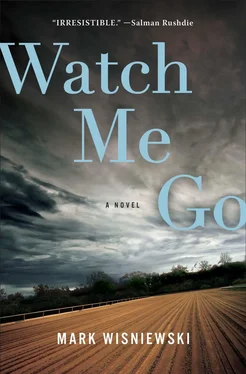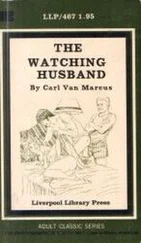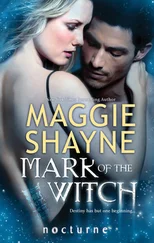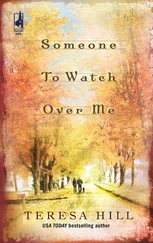Then, to the woman, Bark says, “In cash?”
“As soon as that drum’s in your truck,” she says.
Bark glances at James, who nods.
“Deesh?” Bark asks me, and I know he’s working me over with his eyes, using them to try to convince me in their I-don’t-care-either-way manner, but what I’m watching is the woman’s feet, which are the tiniest bit pigeon-toed. They are also perfectly still, which could mean she’s no longer nervous, but my eyes, I know, are avoiding her fingers and arms. Still, the sight of those pigeon-toed feet has me giving her the benefit of the doubt, maybe because I once had it bad — really bad — for someone who stood like that.
“Why not?” I answer. I haven’t, I tell myself, actually said yes, but when I look up, James is following Bark into the crawl space, the woman checking me out.
“Sure appreciate it,” she says, in the flat way of someone who’s been with enough men to deal with us no problem. But now she’s scratching her collarbone — over and over she’s scratching it, without one bug bite on her. There’s death in that drum, I think, but with her pigeon-toed feet aimed at me, I fall even more in love.
Then she walks off, toward a creek behind her house, and it hits me that if I want my share of the thousand, I should get my ass in that crawl space, since the actual removal of the drum might take but five minutes — and the last thing I need is Bark and James saying I don’t deserve a cent. Then I realize that if I don’t take a cent I might not be guilty of any crime that’s going on here. But wisdom like that helps only if you’re not desperate for cash, plus I need to be in Bark’s truck to get home, and even before I’m done thinking all this I’m on my hands and knees, my head brushing morning glory vines, then on its way through the square opening in the foundation of the woman’s house.
It’s quiet in there, and it stinks. James and Bark are on their bellies, snaking their way over damp dirt and rocks toward the drum, which lies on its side in the far corner. With the thousand in mind, I work myself toward them, trying to get a hand on the drum when they do — but Bark yells, “We got it, Deesh.”
“What are you saying?” I ask.
“I’m saying this is a two-man job, so back off.”
“You trying to cut me out of my share.”
“No. It’s just there ain’t enough room for all three of us if we want to get this thing past us.”
“So what do you want me to do?”
Bark humps up his backside, reaches into a front pocket, pulls out his keys, tosses them toward me. “Pull the truck down the driveway,” he says. His hands dig dirt away from the drum. “As close to the house as you can,” he says.
“Bark,” I say. “I haven’t driven in fifteen years.”
“You’ll remember,” he says. “Just start it, put it in gear, and steer so you don’t hit nothing.”
“Okay,” I say, though Bark’s confidence in me has taken away the little I have in myself. I used to have confidence — gold confidence — but the older I get, I have less. Still, I back myself out of the crawl space, pretend the woman isn’t watching as I jog up the driveway to Bark’s truck, hop inside it, start it, put it in drive and let it roll down there. Steering is easy, but when I put on the brake, I about fly through the windshield. The woman, still near the creek, has her arms folded now, and again she’s checking me out. There’s that kind of thing between us, that curiosity about each other we’d ruin with conversation, and I want to make love to her bad.
Now Bark and James are yanking the drum top first through the hole in her foundation; the drum is too wide to roll out. They struggle like hungry playground kids — whatever’s in that thing is dumb heavy. Wind blows past my face, the woman now picking a weed’s blue flower from between pebbles beside the creek. It’s her husband in the drum, I think. She got carried away in an argument over nothing and the thousand is all they ever saved.
“Deesh,” Bark calls to me. “Gonna help us or not?”
I nod, toss him his keys, which he catches like it’s the old days. I walk toward him and James, and all three of us roll the drum to the driveway, flattening a strip of knee-high grass, acting like we haul mystery drums every day. This one is the rusted old orange you’d expect, but its new yellow lid has barely a scratch or a smudge on it, and as we team up near Bark’s tailgate and lift on the count of three, we take extra care to keep the lid on. Dead weight, I think as we lower the works onto the bed. If this isn’t a corpse, she would have said so.
WHAT I WOULD TELL A JURYfrom the get-go, Deesh, is that pretty much all of the horse folk you find at the Finger Lakes racetrack, not just the Corcorans, have long lived and breathed horseracing. For instance for pretty much all of my twenty-two years, certainly ever since I was the gossiped-about, shabbily dressed girl born to the reticent single mother in Pine Bluff, Arkansas, my dream had been to ride the fastest of thoroughbreds in upstate New York, seeing as that’s what my father did when he was still alive.
A jury would also need to know that thoroughbred racing often comes down to the keeping and telling of secrets. Matter of fact, for my entire life — until just a few months ago — all my mother had ever told me about my father’s death was that it happened three weeks before I was born, and that he had drowned well upstate from here, in a tangle of sun-bleached weeds near a shoreline owned by Tom Corcoran and his wife, Colleen. And that because of all this we were poor to the point that we should be grateful for her job working the counter at the Rexall on Main in Pine Bluff.
See, it wasn’t until the night before my mother and I left Arkansas to head for that lake — because the Rexall was forced to close thanks to a Walmart Supercenter two miles up Main — that she let me in on details beyond those. Like how when the search party of sheriffs and wardens and divers gaffed my father’s corpse, one of his legs was wrapped twice with thick black fish line leading to a huge prehistoric-looking fish. Like how this fish was a muskellunge — or, as people upstate would put it, a “muskie.” How this particular muskie was a monster, easily six feet long. How this muskie then lay in a sheriff’s outboard like guilt in the guts of a killer, and then, after the sheriff took photos, was dropped into the lake for dead by my mother, who, as soon as she headed off toward the Corcorans’ house, heard a splash and turned — only to see the muskie’s tail propel it back into those sun-bleached weeds.
“It was like that fish was death itself saying ‘See y’all later’” was how my mother put it, her point, I figured, being that I should remember that I, too, will die, that therefore I should follow her footsteps when it comes to things like religion and sticking to the straight and narrow.
But that’s getting more into me and my mother rather than Tom Corcoran’s death.
What I’m trying to say is that people out there need to know that tragic death and gruesome injuries and need of all sorts (not just financial) and gambling and welshing and debt and vengeful violence have long, long been a way of life around the Finger Lakes racetrack.
People out there should also know that my father’s death left my mother so depressed and anxious she will never board an airplane. And that, as she and I plunked our butts down in a nasty coach-line bus for the thirty-four hours of drudgery between Arkansas and upstate New York, I was under the false impression that I’d stay with her in the Corcorans’ house for a few weeks to better understand my father’s life and death and legacy, but that, after I’d proven my fearlessness about all that, I’d move someplace where my own life could flourish, maybe someplace west or overseas.
Читать дальше












